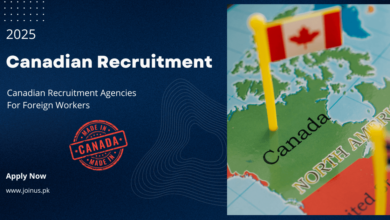Skill Shortage Jobs in Canada for Foreigners 2025
Canada’s employment market is robust and has a substantial demand for skilled professionals across various sectors. The Canadian government, through Immigration, Refugees, and Citizenship Canada (IRCC), has implemented several immigration initiatives designed to address skill gaps in critical industries.
Check Also: Jobs in Canada for UK Citizens – Apply Now
This guide will explore the types of jobs in high demand, the qualifications required, and provide insight into Canada’s immigration system for skilled workers. We’ll also discuss how to enhance your chances of successfully finding work in Canada, navigating immigration programs, and making the most of career opportunities.
High-Demand Job Sectors in Canada:
Canada is seeking skilled professionals in a variety of sectors, including:
- Financial and Investment Analysts
- Software Architects
- Registered Nurses
- Mechanical Engineers
- Welders
- Speech-Language Pathologists
- Occupational Therapists
Key Jobs in High Demand
Web Developer
- Qualifications: Bachelor’s degree in computer science, web development, or software engineering.
- Average Salary: CAD $5,000–$7,000 per month.
- Note: Familiarity with web development tools and programming languages like HTML, CSS, and JavaScript is essential.
Registered Nurse (RN)
- Qualifications: Completion of a nursing program and certification from a regulatory authority.
- Average Salary: CAD $6,000–$8,000 per month.
- Note: Nursing programs in Canada are regulated, and applicants must meet specific licensing requirements to practice in different provinces.
Mechanical Engineer
- Qualifications: University degree in mechanical engineering.
- Average Salary: CAD $6,500–$9,000 per month.
- Note: Mechanical engineers are in high demand for both industrial and commercial projects across Canada.
Accountant
- Qualifications: University degree and completion of a professional training program.
- Average Salary: CAD $5,500–$7,500 per month.
- Note: Chartered Professional Accountant (CPA) designation is often required.
Biomedical Engineer
- Qualifications: Bachelor’s degree in biomedical engineering and licensing.
- Average Salary: CAD $6,500–$9,000 per month.
- Note: Biomedical engineers typically work with medical devices or healthcare systems.
Benefits:
- Increased Demand for Skilled Workers:
Many of these professions face skill shortages, making them an attractive option for foreign workers. - Competitive Compensation:
Employers in high-demand fields often offer attractive salary packages to attract and retain qualified professionals. - Immigration Opportunities:
Skilled workers have access to various Canadian immigration programs, such as the Express Entry system or Provincial Nominee Programs (PNP), facilitating a smoother immigration process. - Economic Growth:
Skilled workers help drive Canada’s economy, especially in industries where innovation and development are needed. - Job Security:
Due to the ongoing demand, these sectors offer greater job security and career growth opportunities.
Navigating Canada’s Immigration System:
Canada’s immigration system is generally welcoming to skilled workers, but navigating it can be complex. Here’s a brief overview of the immigration programs most relevant to skilled professionals:
- Express Entry System: A points-based system used to assess candidates for permanent residence based on factors like age, education, work experience, and language proficiency.
- Provincial Nominee Program (PNP): Allows provinces to nominate skilled workers for immigration based on local labor needs.
- Federal Skilled Worker Program (FSWP): For skilled professionals who meet specific criteria in areas like education and work experience.
For detailed, up-to-date information about eligibility requirements and processing times, consult the official IRCC website or speak to an immigration consultant.
Finding Employment in High-Demand Sectors:
To help you find jobs in Canada’s labor market, consider these resources:
- Government of Canada Job Bank: A comprehensive online platform offering job listings, including in-demand sectors.
- National Occupational Classification (NOC): Use the NOC to identify job classifications and skill requirements.
Additionally, many Canadian provinces offer job portals tailored to their specific labor markets:
- Alberta: jobpostings.alberta.ca
- British Columbia: jobbank.gc.ca
- Ontario: yorkemployment.com
Credential Recognition and Language Proficiency:
If your qualifications were obtained outside of Canada, you may need to have them evaluated by a recognized Canadian body. The Canadian Information Centre for International Credentials (CICIC) provides guidance on how to get your credentials assessed.
Language proficiency is another key factor. Most immigration programs require proficiency in English or French. Free or subsidized language training programs are available to help you improve your language skills.
Additional Considerations for Skilled Workers:
While Canada’s labor market offers numerous opportunities, skilled workers often face challenges such as:
- Securing a Job: Even in high-demand sectors, some jobs may require experience in Canada or familiarity with local regulations.
- Cultural Integration: It’s important to be prepared for cultural adjustments when moving to a new country. Joining local professional networks and community groups can help ease the transition.
- Housing and Cost of Living: In major urban centers like Toronto and Vancouver, housing can be expensive. Researching affordable living options and budgeting effectively will help you manage your finances as you settle in Canada.
Conclusion:
Canada’s skilled workforce demand is strong, and foreign professionals have excellent opportunities to build a rewarding career while contributing to the country’s economic growth. By understanding the immigration process, obtaining the right qualifications, and using available resources, you can successfully navigate Canada’s labor market.
For more personalized assistance, consider consulting with a licensed immigration consultant or lawyer to ensure your application aligns with current immigration policies.
Final Note
To maximize your chances of success, stay informed about changes in immigration policies and labor market trends. Continuous learning, staying updated on industry certifications, and engaging with professional communities will further enhance your prospects as a skilled immigrant in Canada.
Frequently Asked Questions:
-
What is the biggest shortage of jobs in Canada?
Registered nurses (RNs) are in critical demand across many provinces due to the COVID-19 pandemic, with several provinces issuing targeted draws for RNs through the Provincial Nominee Program (PNP).
-
How do I find jobs in Canada?
Utilize the Government of Canada Job Bank, the National Occupational Classification (NOC), and provincial job portals to find employment in high-demand fields.
-
Are there specific immigration programs for skilled workers?
Yes, programs like Express Entry and Provincial Nominee Programs (PNP) are designed to bring skilled workers to Canada.



